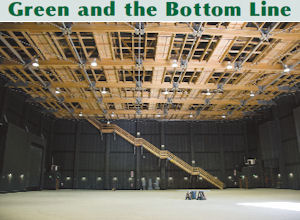Going green is not a new concept for Warner Bros. Studios in Burbank. Environmental sustainability has been one of its core objectives for close to 20 years. But the company’s eco-friendly practices are evolving to new heights. “In the beginning it was not as much about saving money; we were taking a leap based on values,” said Jeff Nagler, executive VP of Warner Bros. Studios Facilities Group. “We had to change the way this industry does business, and change the culture.” The company considers recycling, saving energy and other environmental practices to be pillars of corporate citizenship. And continuing to adopt new technologies and cutting-edge environmental practices is now having an undeniable effect on cost savings. LEED and solar Warner Bros. is a forerunner in obtaining Leadership in Energy and Environmental Design (LEED) certification for its production and other buildings in the Burbank area. The company secured LEED Gold certification for its 21,600 square foot Stage 23. It’s the first green sound stage built by a major Hollywood studio. Among the green elements, the company installed a 100 kilowatt solar power system on the roof. About five years ago it secured LEED silver certification for renovations done to Building 151. And over the past couple of years, Warner Bros. installed another solar system capable of generating 500 kilowatts of power. “We really jumped into solar energy in a big way,” said Nagler, “and a lot of that has to do with our partnership with the City of Burbank.” A combination of federal and city incentives is helping pay off the capital investments in six to seven years, he added. Warner Bros. is saving more than $1 million per year in energy costs. The savings are related to solar and the company doing energy efficient retro-fits. It’s also installing low-flow water devices. Nagler said the company is currently budgeting for more solar panels on the roofs of sound stages. The goal is to eventually cover most of the south facing rooftops. Green production The movie and television industry was notoriously wasteful. Historically, every time a show ended its run or movie was done filming the set was torn down and hauled off to the dump. Feeding hundreds of cast members also generated a heap of waste. Warner Bros. established green production guidelines to minimize that waste. Through re-using set materials, recycling, and other initiatives, the company is diverting 50 percent of its waste from the landfill. Nagler said that has reduced waste hauling costs significantly. “It takes extra effort, but nobody is fighting us,” he said. “Twenty years ago we had to convince people why to do these things, but there are no debates anymore. It’s fun and a source of pride.” In filming the television show “The Closer” scripts are recycled and biodiesel is used for vehicles. The basecamp for the movie “Valentine’s Day” was totally solar powered, used biodiesel for vehicles and provided crew members with re-usable thermoses for drinks. Warner Bros. is also planning on spending $7 million-$8 million over the next five years to upgrade its fleet of more than 300 vehicles to low-emission engines. Nagler said the investment will not save money at first but should pay off in the long-run. The ripple effect Warner Bros.’ environmental programs have a positive impact on employee morale –another key element of sustainability. Many workers feel good about the company’s practices and often implement similar things at home, said Nagler. Coming up with the next environmental initiative is fun and challenging, he added, and other studios and entertainment industry folk are catching on. “None of this is simple; it takes effort,” said Nagler. “I think our industry is making great strides to be a responsible partner in preserving the environment. And we’re going to keep doing this.”
